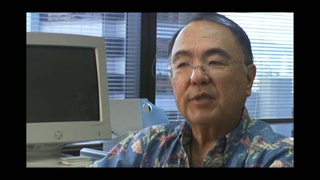Interviews
Starting to get angry
After basic training or during basic training, I got a furlough and came to LA and there was talk of evacuations so I helped my mother pack and then I went to the Japanese school where we did our kendo and the boy scout meeting[s] and I see many people moving into the classrooms and I said,” what’s going on here?” I says. “These are people from Terminal Island, they were booted out of there. And had no place to go, so they’re here.” So I said, hey how come they were booted out?
You know, that’s when I started to think, hey something is wrong here and I think that was the first time my blood began to boil, I think. Even in the army before that I had no problem- basic training, it was all mixed group, I had a little ROTC and the boy scouts- we had close order drill, so even the sergeant knew that’s why he had me leading the whole platoon, as just a trainee, you know, leading the platoon and all. I didn’t feel any discrimination in the army, of course later on I applied for officer’s training, then I was told “you’re not eligible” so I went for a non-com class to become a non-commission officer but there was slight indication of that I says, I guess I am Japanese and all that, but I didn’t blame anybody, I says, well such is life, you know, but it was at the Terminal Island “expulsion” you might say that, that’s the first time I start to feel a…I was starting to get angry, you might say.
Date: March 25, 2005
Location: California, US
Interviewer: Sojin Kim
Contributed by: Watase Media Arts Center, Japanese American National Museum
Explore More Videos


Identity crisis (Spanish)
(b. 1969) Former president of Centro Nikkei Argentino.

Dancing in Japan as an American, in the US as Japanese
(1918-2023) Nisei Japanese kabuki dancer

Lack of political power led to camps
(1924-2018) Researcher, Activist


World War II hysteria against Japanese in New York City
(1924-2018) Researcher, Activist

Positive experiences with Asian Americans for Action
(1924-2018) Researcher, Activist

His testimony has more credibility because of his race
(1922 - 2005) Former U.S. Army counterintelligence officer

Different tension between East Coast and Los Angeles
Japanese American Creative designer living in Japan

Being an American soldier and an "enemy alien"
(1923-2011) Lawyer, MIS veteran, founder of Francis and Sarah Sogi Foundation

Not relating to Japan Americans' experiences on the mainland
(1923-2011) Lawyer, MIS veteran, founder of Francis and Sarah Sogi Foundation


Less information about Hawai‘i in mainland
(b.1944) Founder of Kobayashi Group, LLC

A teenager's memories of how a local newspaper misrepresented Japanese Americans
(b. 1925) Draft resister

The role of the media in influencing people's opinions
(b. 1925) Draft resister
